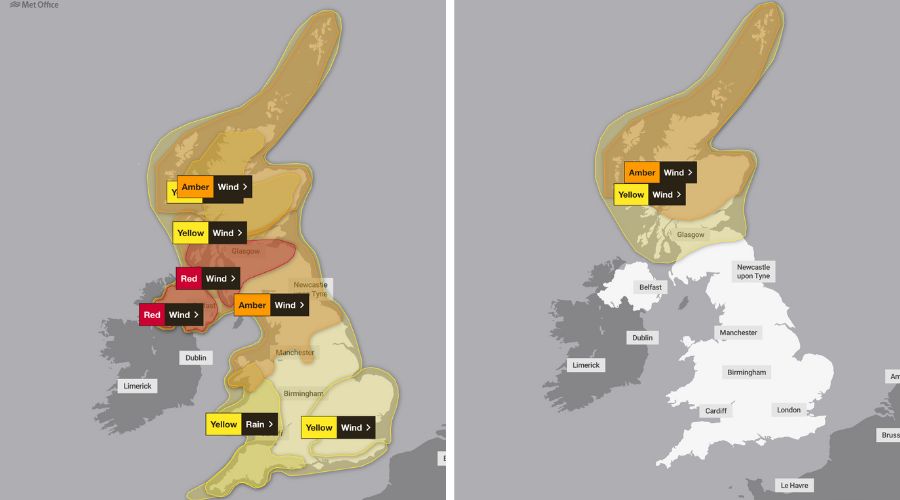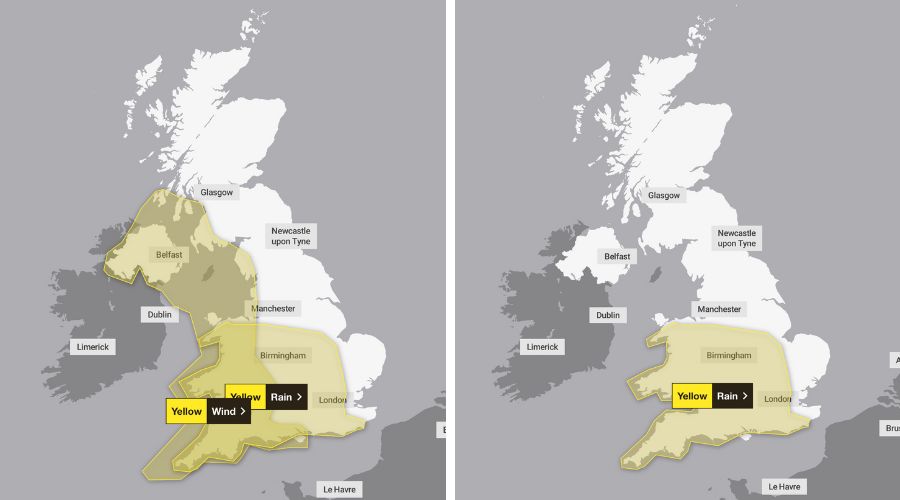Storm Éowyn warnings upgraded to red
23rd January 2025
Weather warnings have been updated for Storm Éowyn, which is forecast to bring disruptive winds, heavy rain and snow for some.

Red warnings for wind have been issued for Northern Ireland, and central and southwestern parts of Scotland on Friday due to Storm Éowyn.
Wider amber and yellow warnings are in place for wind, and yellow warnings for rain and snow.
All parts of the UK covered by one warning at some point on Friday.
Met Office chief meteorologist, Paul Gundersen, said:
“We reserve the issuing of red warnings for the most severe weather which represents a likely danger to life and severe disruption, and that is the case with Storm Éowyn.”
Risk to farms
NFU Mutual rural affairs specialist, Hannah Binns, said: “Isolated rural farms, dwellings and communities are more at risk from extreme weather, and with severe gales expected alongside rainfall and snow, we urge everyone to plan ahead and take care if working outside.
“Safety for farmers, family members and workers should always be the number one priority and while fully understanding the pressures farmers are under, it is vital they avoid taking risks which could lead to injury or fatalities.”
NFU Mutual has issued advice to farmers to help keep themselves and their property safe (below).
READ MORE: Storm Éowyn: Everything we know so far
Most impacted areas
Mr Gundersen said it will be widely very windy on Friday, with additional hazards from rain and snow.
But the strongest winds and most significant impacts are likely to be in Northern Ireland and central and southwestern parts of Scotland within the red warning areas.
There, winds could gust 80-90mph quite widely for a time, and potentially up to 100mph for exposed coasts in particular, he added.
This is the first red warning issued for Northern Ireland since the Met Office moved to impact-based warnings in 2011.
However, Mr Gundersen said even those away from the immediate red warning areas are likely to see disruptive weather, with travel plans likely to be severely impacted, as well as the possibility of power cuts for some.
After Storm Éowyn on Friday and early on Saturday, further wet and windy weather is likely on Sunday.
Further yellow warnings have been issued for wind and rain in parts of the country on Sunday and Monday.

READ MORE: Jeremy Clarkson’s Diddly Squat Farm will host Cereals 2026
READ MORE: Farmers seek financial advice following tough last quarter of 2024
Regional breakdown
Northern Ireland:
- Red warning for wind from 07:00 until 14:00 Friday
- Amber warning for wind from 6:00 until 21:00 Friday
- Yellow warning for wind from 00:00 – 23:59 Friday
Scotland:
- Red warning for wind for western and central areas of Scotland 10:00 until 17:00 Friday
- Amber warning for wind in southern half of Scotland 06:00 until 21:00 Friday
- Yellow warning for winds 00:00 until 23:59 Friday
- Yellow warning for winds 06:00 until 23:59 Friday
- Yellow warning for winds 00:00 – 15:00 Saturday.
Northern England:
- Yellow warning for snow 03:00 until 12:00 Friday
- Amber warning for wind from 06:00 until 21:00 Friday
- Yellow warning for winds 00:00 until 23:59 Friday.
Southern England:
- Yellow warning for wind in southwest England and the southern coast of England from 07:00 until 18:00 Thursday
- Yellow warning for wind from 00:00 until23:59 for much of the south of England Friday
- Yellow warning for wind from 05:00 until15:00 for parts of the southeast of England Friday
- Yellow warning for rain from 00:00 until 09:00 in the southwest of England on Friday.
Wales:
- Yellow warning for winds in western parts of Wales from 07:00 until 18:00 Thursday
- Yellow warning for rain across much of Wales from 00:00 until 09:00 Friday
- Yellow warning for winds for much of Wales from 05:00 until23:59 Friday
- Amber warning for wind for north Wales from 06:00 until 21:00 Friday.
NFU Mutual advice for storms
Hannah Binns said: “Farmers can consider moving livestock to higher ground to protect them from flood water as well as moving machinery and electrical items.
“For those working alone, it is important they tell someone where they will be and what time they should be back as well as carry a charged mobile while working outside and use the What3Words app to help provide a location in the event of an emergency.
“It is also worth checking alternative fuel and power sources in case of a power cut or disruption, such as making sure generators are in working condition and able to run at full load for long periods of time.”
Before the storm:
- Stay alert for Met Office weather warnings.
- Regularly inspect your farm and keep on top of maintenance by carrying out necessary repairs to buildings, fences and walls whilst the weather is calm.
- Check that tiles, slates, and roofing sheets are in place and put away any items that cannot be secured.
- Avoid being near barn doors if there are high winds.
- Make sure gutters are not leaking and are clear of leaves and other debris.
- Protect and lag water pipes in vulnerable areas and know where the water supply is so that you can turn it off in the event of burst pipes.
- Ensure you have a good tree inspection programme in place, paying particular attention to trees bordering buildings, roads, railway lines and rights of way.
- Prepare for power cuts: have torches and batteries to hand and make sure any generators are ready to use if required.
- Plan evacuation routes to get staff and livestock to safety in the case of extreme weather such as floods – identify higher ground that you can move livestock to in event of flooding.
- Have your insurer’s emergency helpline available.
During the storm:
- Do not leave the house or make journeys unless absolutely necessary.
- If you need to leave the house, avoid the sheltered side of walls when walking.
- If journeys are essential, drive slowly and carefully, staying aware of high winds on exposed roads and ice and water on the road.
- Do not attempt emergency repairs during the storm.
- Keep all building doors and windows closed.
After the storm:
- Be aware after a storm or weather event, power cables or powerlines may have been brought down.
- Don’t enter any buildings that could be unsafe following a storm.
- Report any damage to your insurer as soon as possible.
NFU Mutual has a network of agents in more than 280 offices across the country who are on standby to progress repairs after the storms, including making emergency payments and settling simpler claims immediately.
Read more rural news.
